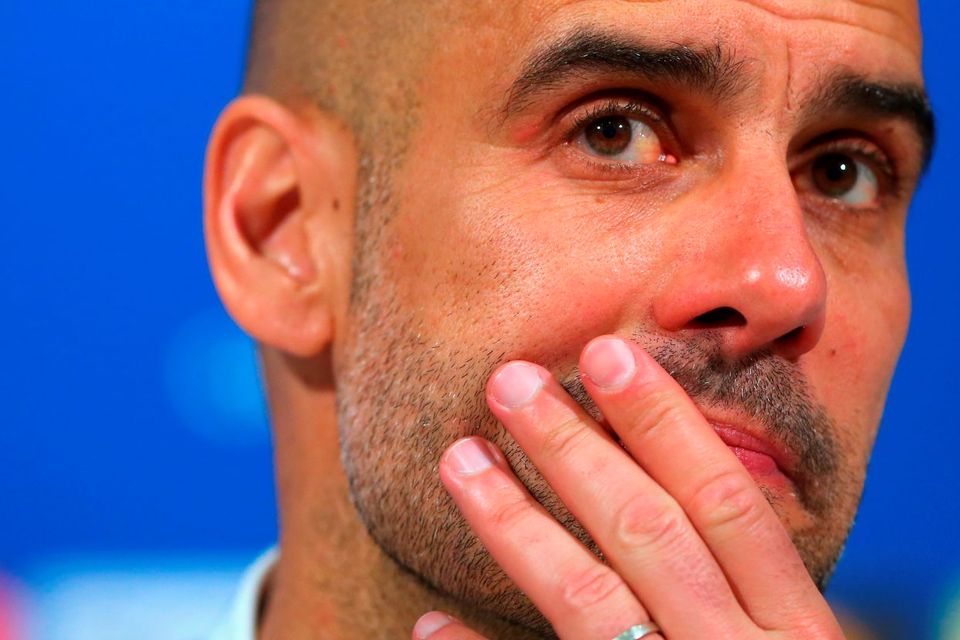Champions League flops at Bayern Munich do not make Pep Guardiola a failure
Pep Guardiola has failed to win the Champions League with Bayern Munich (Getty Images)
Pep Guardiola has not arrived in English football yet, but his presence is already being felt within the game by those with a connection, however tenuous, to Pep Inc, who have been summoned for discreet conversations for their views on a range of topics.
Not, of course, with the man himself, who continues to be consumed by his day job in Bavaria, which is coming to a close now after elimination on Tuesday night from the Champions League and only one more point required to pick up his third Bundesliga title. But the Guardiola brand is too big, too meticulous, too damn fixated on success to do anything as naive as rock up at Manchester City on July 1 and start trying to figure it all out from scratch.
When you hire a manager of Guardiola's status, you get the full package, which includes the advance guard that has mainly been orchestrated by his agent and brother Pere, who has forged substantial ties with City's Spanish hierarchy. But Guardiola's preparation goes beyond talking to his new employers - his people have embarked on an informal independent audit of City themselves. Who should go, who should stay, and who could be a problem.
It would not be too far off the mark to say that Guardiola, the archetype of the modern manager, offers the kind of service you might expect of the business turnaround expert, a top-whack consultant who promises to deliver results and then moves on. In the meantime, he wants to know everything: how much does the first-choice left-back earn? How are the U-15s shaping up? What is in that cupboard?
It is a point worth making after Guardiola's Bayern Munich crashed at the Champions League semi-final stage for the third successive season with the usual questions asked about where that leaves his legacy. This being football, with all its well-honed cognisance of the fine margins of performance, Guardiola not winning the trophy Bayern won in 2013 under Jupp Heynckes, is already being confidently clicked and dragged by the usual suspects into the folder marked failure.
Pedestal
Of course, results are results and it was those that put Guardiola on the pedestal in the first place. They always matter more than anything else, but only one manager will win the Champions League this season, so that means an awful lot of failed coaches lying on Europe's best beaches this summer. What we can say is that, after two Champions League titles in four years at Barcelona, Guardiola has demonstrated that even he is not a guarantee of winning it. So, if he is not that, then what is he?
Rio Ferdinand said on Tuesday night that clubs had to decide between playing football in a certain style - the Guardiola way, he meant - or whether they want to reach finals and win trophies. But Guardiola does not play a certain way for the sake of it, he does so because he thinks that is the best way to win trophies, just as Diego Simeone drills his Atletico Madrid a very different way to achieve the same.
When you hire Guardiola, you are hiring his creed and his approach. It is all-encompassing and you are obliged to take the best and live with the rest - goodness knows, he sounds pretty high maintenance - on the basis that you believe it will yield results. If your instinct is to follow him around the place suggesting alterations, then there is no point. With Guardiola, there is no discount offering, just the premium package.
His teams play a massively high possession game that wears away opposition, as Bayern have done this season and as they did on Tuesday night with 69.5 per cent of the ball. He will make decisions that support that model, even if it means leaving out Thomas Muller, as he did in the first leg in Madrid, and these are the big decisions that tend to get focused upon in the event of the wrong outcome.
For Guardiola, however, they do not seem like big decisions. They are the natural corollary to having a philosophy about trying to win at the elite level.
The best any team can hope for, even the super-clubs of the modern age, is to start the season with a coherent, well-judged approach and hope it delivers. There is always the risk that a penalty miss by one of the world's best strikers in a semi-final second leg is the difference between a good season and a bad one.
Any successful football strategy, and especially the variations pioneered by Guardiola over the last six years, provokes a reaction - much like the proverbial virus that mutates to overwhelm the antidote. The difference in 21st century football is that it happens so rapidly - a consequence of the sophistication of modern analysis, and some of the quite brilliant coaches about.
So it is that for the Manchester United of 2008, there was a Barcelona of 2009 and 2011; and for the Barcelona of 2011, a Chelsea of 2012 and so on, up to the Atletico of 2016 who currently look like everyone's worst nightmare. City have hired a great problem-solving coach whom they believe can evolve further in this fierce battle of species in European football.
If you want to count the European Cups won by Guardiola in Munich then, by all means, blow the dust off the trophy cabinet shelf and declare him a failure. If you want to be realistic about how absurdly difficult it is to win just one Champions League, give credit to Simeone on coaching a side who have evolved from the hunted to the predator.
As for City, they have a man they trust to come up with a very good plan to win multiple Champions Leagues rather than a man who can guarantee it.
No one can do that, but some will get closer more often than others. (© Daily Telegraph, London)















